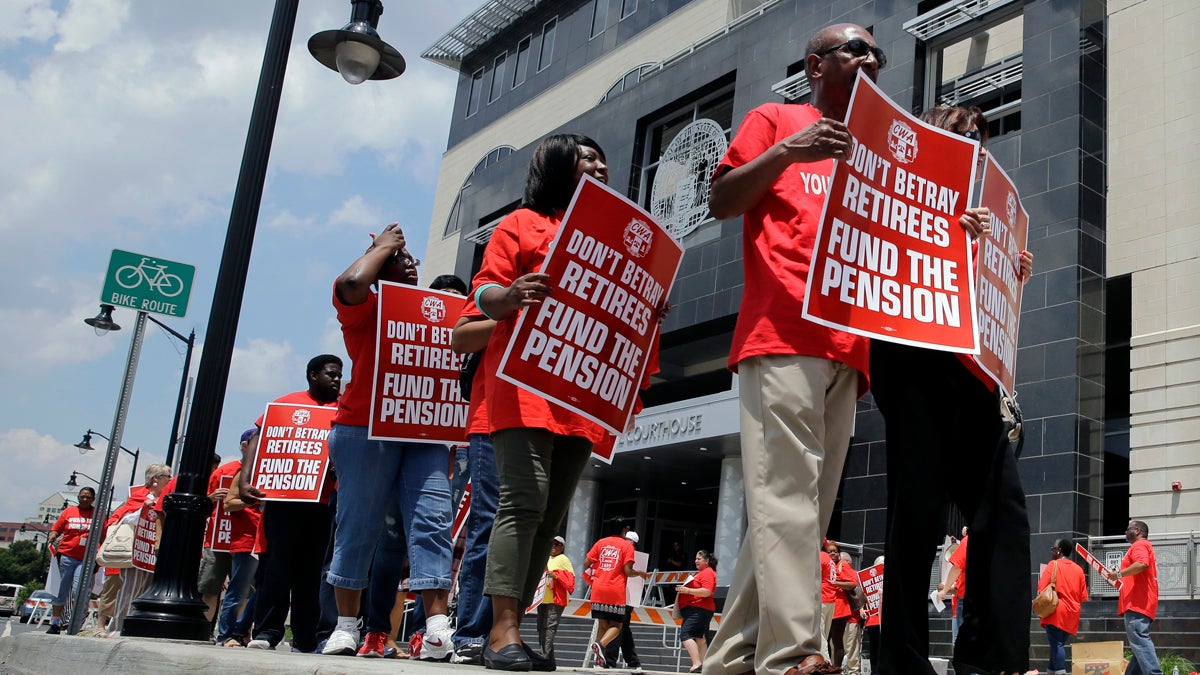New Jersey Policy Perspective study contradicts Christie’s claim that pension payments are excessive

Union members carry protest signs as they march outside the Mercer County Criminal Courthouse before arguments June 25, 2014, over Gov Christie's plan to use pension payments to balance the budget. (AP Photo/Mel Evans)
New Jersey’s public employee pensions are not “exorbitant,” as Gov. Chris Christie has proclaimed, at least not compared with other plans across the country, asserts a new report by a progressive policy organization.
The report released earlier this month by New Jersey Policy Perspective does not compare average payments to retirees. It instead compares three other indicators — cost-of-living increases, the “multiplier” that calculates pensions per year of service, and employee contributions.
According to NJPP’s methodology, which drew on data from the National Association of State Retirement Administrators, New Jersey’s pension plans rank 95th out of the 100 largest pension plans in the nation. In other words, based on those criteria, 94 of those 100 pension plans are more generous than New Jersey’s.
NJPP’s release of the report comes out after the trustees of the state’s largest pension funds went to court to try to force Christie to live up to his promise to make full payments to the system.
And it comes as a commission appointed by Christie continues to examine possible changes designed to keep the pension funds solvent without overtaxing the state budget.
“I think it’s crucial that we not be misguided by inflammatory statements that depict New Jersey’s retirement benefits in a light that is inaccurate,” said Gordon MacInnes, NJPP president, referring to Christie statements suggesting that New Jersey’s pension benefits are overly generous. “This is a very complicated issue. Facts matter.”
Both the governor’s office and the state treasurer’s office did not respond to requests for comment on the NJPP report.
The study, done by Stephen Herzenberg, reached a different conclusion than a report issued in March by the American Enterprise Institute that looked at average pension payments.
Titled “Not So Modest: Pension Benefits for Full-Career State Government Employees,” the AEI study ranked the average pension payment for career employees — defined as those with more than 30 years in government. New Jersey’s average was $41,256, representing 73 percent of a full-time worker’s income, putting the Garden State at the midpoint compared to other states.
But Herzenberg, executive director of the Keystone Research Center, said the AEI study was “cooking the books” in choosing to compare average pensions for a long-time employee, who would have many more years of service than the typical retiree and would thus be expected to have a higher payment.
New Jersey’s average pension benefits are actually considerably lower — $26,000 overall, with $25,000 for state workers, $16,000 for local government employees, $40,000 for teachers, and $41,402 for police and firemen — when the totals are adjusted to take into account the amount of Social Security benefits they do not receive, Herzenberg said, citing state Division of Pensions and Benefits data.
The AEI report also does not consider two indicators that Herzenberg calls key — employee contributions and inflation protection.
New Jersey fared worst in the second area, having eliminated cost-of-living adjustments as part of the 2011 pension reform deal between Christie and the Legislature. Two-thirds of the 100 pension plans in the study offered cost-of-living adjustments, as New Jersey used to.
The state ranked better in the area of employee contributions, Herzenberg said, but that will change as employee contributions continue to rise as a result of the 2011 reforms.
“New Jersey public employees face a triple whammy that gives them among the worst pensions in the country: they contribute heavily to their own pensions, receive only modest pension increases with each additional year of service, and get no inflation protection at all in their benefits,” Herzenberg said.
Before the 2011 reforms, he said, New Jersey’s pensions would have ranked in the middle of the 100 plans studied in terms of their generosity.
New Jersey’s seven-state pension plans have about 250,000 active members and 151,000 retirees, according to the governor’s pension commission’s September status report.
Herzenberg’s report, which covered only state and local employee and teacher pensions, cited a 2010 Rutgers study that found that while New Jersey public employee benefits were superior to those of the private sector, that was more than offset by lower salaries.
Total compensation for public employees was actually 4.1 percent lower than for comparable private-sector workers.
Pension benefits are not the cause of the state’s fiscal woes, Herzenberg said.
“The cause is the consistent failure of the state not to put in the money it was supposed to … The action by Gov. Christie not to make the full payment this year is part of a pattern of failure.”
Christie cut $900 million from last year’s budget and is underfunding pensions by $1.5 billion this year.
Last week, the Public Employees Retirement System, Police and Fire Retirement System, and Teachers Pension and Annuity Fund filed a suit seeking to force Christie to make the full actuarially required payments needed to cover the system’s unfunded liability. Earlier this month, Moody’s Financial Services put that liability at $83 billion and said the funds could run out of money as soon as a decade from now if the state does not fully fund the system.
In 2011, Christie agreed to make the necessary payments to the pension funds as part of a deal in which legislators would eliminate the cost-of-living increases and incrementally raise the amounts employees contribute to their pensions.
If Christie can go back on his agreement to fully fund the system, that deal should be nullified, and COLAs and contributions should be restored to their pre-2011 levels, the unions argue.
Christie, meanwhile, contends in court that he cannot be forced to honor the reform law because it is unconstitutional, since it improperly forces the state to make future appropriations.
Christie made pension reform the theme of several town-hall meetings he held over the summer, in which he said the state cannot afford to keep funding the current system.
He created the pension study commission in August to “make recommendations regarding the goals and criteria for a sustainable retirement and health-benefit system.”
It its September report, the commission wrote that New Jersey has been the fourth-worst of all the states at funding its pensions and that the pension and health-benefits systems “face problems that are dire and likely to worsen unless action is taken.”
_____________________________________
NJ Spotlight, an independent online news service on issues critical to New Jersey, makes its in-depth reporting available to NewsWorks.
WHYY is your source for fact-based, in-depth journalism and information. As a nonprofit organization, we rely on financial support from readers like you. Please give today.




